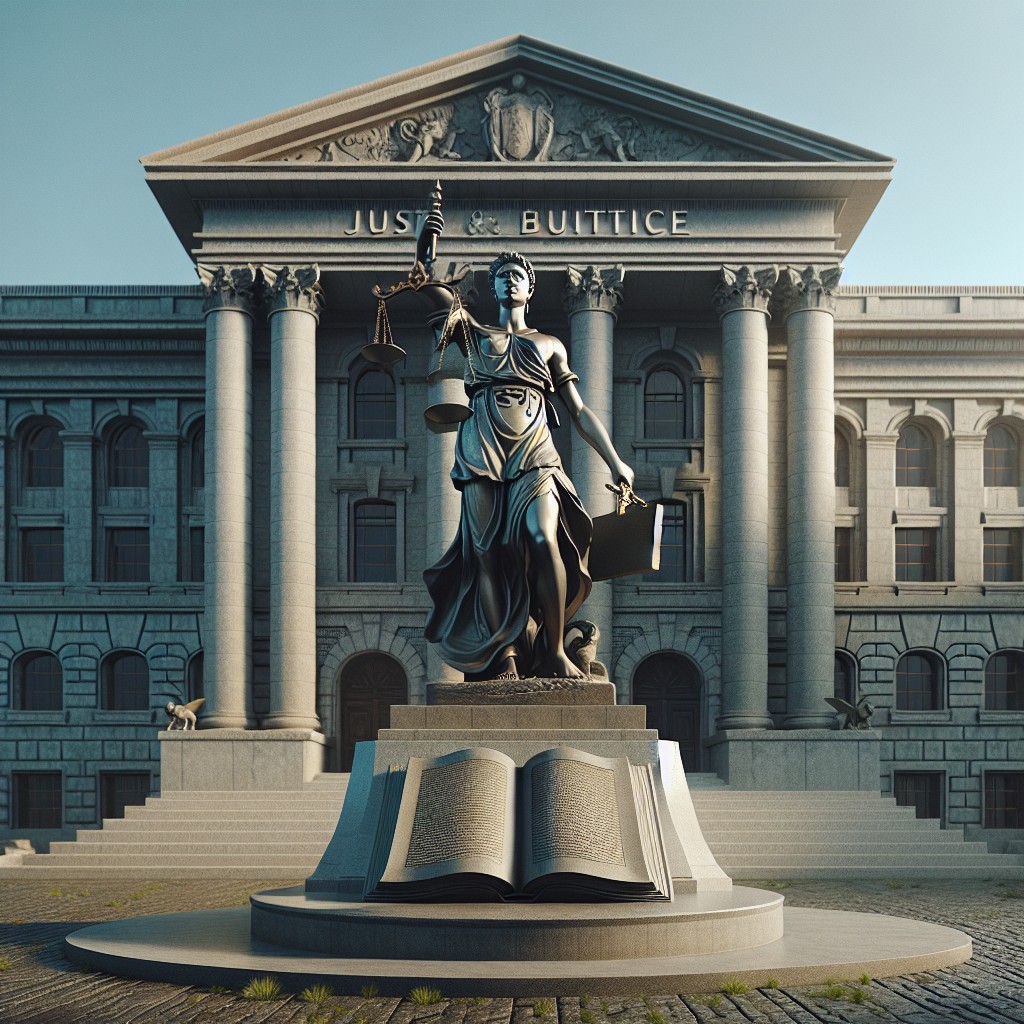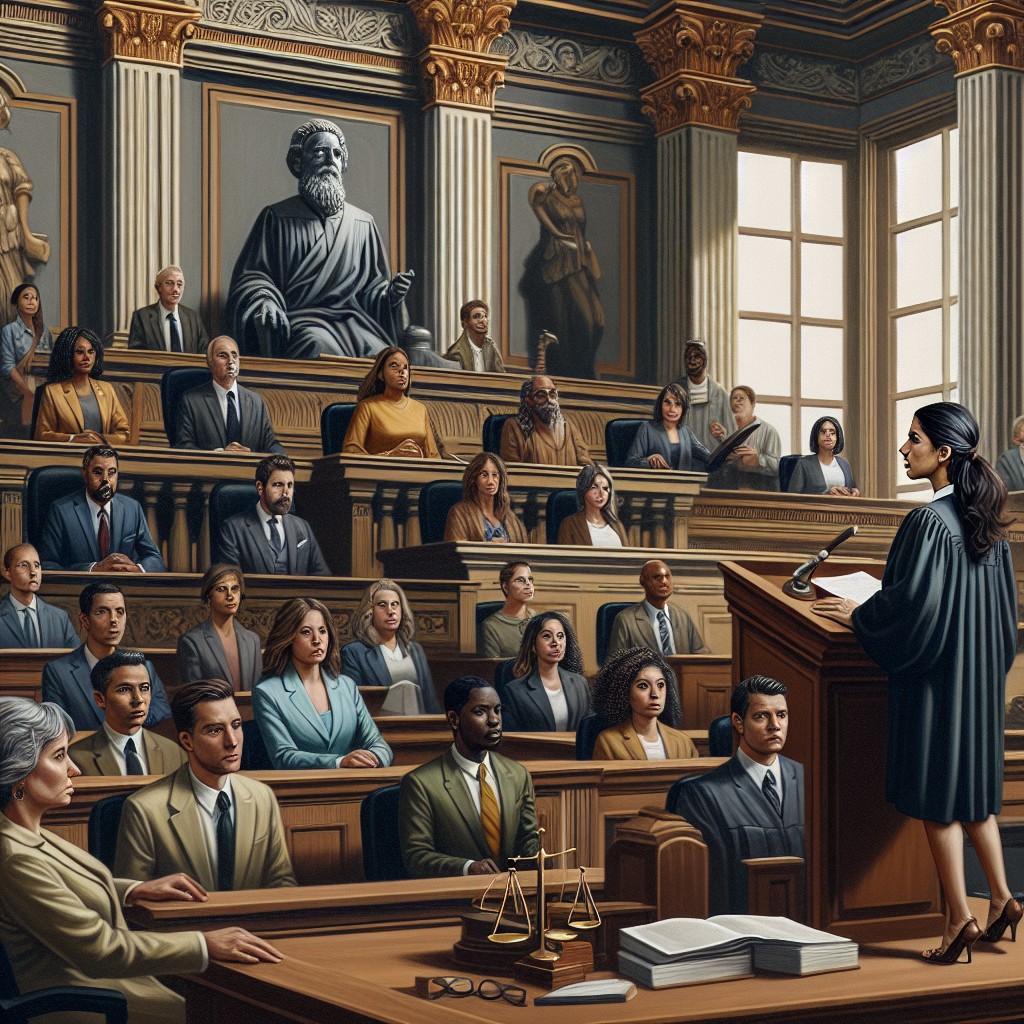Last updated on
Delving into the intricacies of justice building, this article offers intriguing insights because it unravels the often overlooked aspects that influence legal fairness and institutional effectiveness in the modern society.
Key takeaways:
- FLACO ensures constitutional rights accessible to all.
- New judges uphold law, ensure fair trials, manage courtrooms.
- Case analysis involves examining facts, legal theories, evidence.
- Valentine’s Day promotes awareness of healthy relationships, domestic violence.
- Super Bowl has legal implications on trademark, liability, betting.
Table of Contents
Understanding FLACO and Constitutional Law

The Federal Legal Assistance Clinic Organization, commonly known as FLACO, plays a crucial role in the practical application of constitutional law. By providing legal aid, FLACO ensures that the rights enshrined in the constitution are accessible to all citizens, especially those who might not afford private legal consultation.
Here are a few noteworthy points that underscore FLACO’s functions and their interplay with constitutional law:
- Right to Counsel: FLACO upholds the Sixth Amendment by ensuring legal representation is available to individuals, regardless of their financial status.
- Legal Education: Through FLACO, law students and young attorneys often receive hands-on experience, bridging the gap between academic theory and practical application.
- Public Awareness: FLACO initiatives often include community programs that educate the public on their constitutional rights, promoting informed citizenry.
- Policy Advocacy: FLACO not only provides services but also advocates for policy changes that enhance the fairness and effectiveness of the justice system.
- Legal Reform: FLACO’s cases sometimes lead to precedence in constitutional law, impacting the legal landscape by challenging existing laws and advocating for reform.
Understanding FLACO’s mission elucidates the dynamic nature of constitutional law, showcasing the constant evolution of legal interpretation as it adapts to the needs of society.
Key Responsibilities of New Judges

The induction of a new judge into the judiciary encompasses a range of responsibilities critical to maintaining the integrity of the legal system. Paramount among these duties is the upholding of the law, where judges are entrusted with interpreting legislation consistently and impartially. They also have the task of ensuring fair trials; a judge’s courtroom is the cornerstone of justice where the scales must be balanced without prejudice or bias.
New judges are further responsible for managing their courtroom efficiently, a role that involves setting schedules and hearing motions alongside managing the often-complex processes of trials. Significantly, they have to render decisions and write opinions that are not only legally sound but also clear and understandable, as these decisions can set precedents for future cases.
Beyond the bench, judges contribute to the legal profession by mentoring junior colleagues and sometimes participating in community outreach to foster public trust and understanding of the justice system. These key roles, together with a steadfast commitment to ethical conduct, underpin the multifaceted job of a new judge.
Solving Legal Mysteries: Case Analysis
Delving into case analysis provides a fascinating window into the judicial system’s inner workings. This approach involves dissecting court proceedings to uncover the rationale behind verdicts and understand the intricacies of legal arguments.
Here are key aspects to consider:
- Factual Foundation: Start by examining the who, what, when, where, and why of a case. Understanding these five Ws can help untangle complex legal situations.
- Legal Theories: Identify the laws and precedents attorneys draw upon. This establishes the legal framework within which the case operates.
- Argument Strength: Review the persuasiveness of the arguments presented. Consider their logical consistency and how well they align with legal principles.
- Evidence Evaluation: Scrutinize the evidence used to support claims. The quality and relevance of evidence can be pivotal in shaping outcomes.
- Judicial Interpretation: Analyze how judges interpret the law in their opinions. Interpretation can vary and significantly impact the application of laws.
- Impact Assessment: Reflect on the broader implications of a case. Legal decisions often resonate beyond the individuals directly involved and can affect future rulings.
By focusing on these elements, one can gain deeper insights into the application of justice and the resolution of legal puzzles.
Significance of Justice-Related Events On Valentine’s Day
Valentine’s Day might typically conjure images of flowers, chocolates, and sentimental cards, but it also holds unique significance in the realm of justice. Legislation has increasingly recognized the importance of domestic harmony, and many jurisdictions observe this date as an opportunity to promote awareness about healthy relationships and the legal consequences of domestic violence.
Awareness Campaigns: Legal bodies often use Valentine’s Day to launch initiatives aimed at educating the public on issues like consent and emotional abuse.
Legal Aid Services: Pro bono clinics may extend their services on this day to support individuals seeking restraining orders or advice on family law matters.
Court Events: Some courts observe Valentine’s Day by holding mass wedding ceremonies, highlighting the cooperative link between legal institutions and societal traditions.
Policy Announcements: It can be a strategic day for the announcement of legislative reforms or funding for programs focusing on relationship education and domestic abuse prevention.
Valentine’s Day thus serves as a strategic platform for justice-related outreach, intertwining the themes of love and respect with legal awareness and action.
Legal Implications of Super Bowl Sunday 2024
The Super Bowl is more than just a sporting event; it’s a cultural phenomenon that intersects with the legal sphere in several ways. Here are key points to consider:
1. Trademark Infringement: Businesses need to be cautious when using “Super Bowl” in promotions or advertisements due to its trademarked status. To avoid infringement, alternative phrases like “The Big Game” are often used.
2. Liability Issues: On Super Bowl Sunday, establishments such as bars and restaurants that host viewing parties must ensure the safety of their patrons. Overcrowding and over-service of alcohol elevate the risk of liability claims.
3. Betting Laws: With sports betting becoming legal in more states, businesses and individuals must understand the regulations governing gambling, particularly on such a high-stakes game.
4. Employment Concerns: Employers may encounter issues like absenteeism or decreased productivity post-Super Bowl. It’s important for companies to know their rights and responsibilities regarding workplace policies on attendance and conduct.
5. Intellectual Property: The broadcast of the Super Bowl involves complex intellectual property rights, particularly concerning the halftime show and the airing of commercials.
As these points suggest, the Super Bowl’s legal implications ripple through various aspects of law, underscoring the need for awareness and preparation across multiple domains.
The Importance of Swift and Sure Justice
Efficiency and certainty in the justice system are paramount for maintaining public trust and the rule of law. When justice is swift, it ensures that legal consequences follow promptly after an offense, which can deter potential wrongdoers and provide timely resolution for victims. Sure justice, on the other hand, reflects the idea that the outcomes of legal proceedings should be consistent and foreseeable, with each case treated equitably according to the law.
Critical points explaining these concepts include:
- Deterrence: Prompt justice can discourage criminal behavior by reinforcing the notion that illegal activities will result in quick repercussions.
- Victim reassurance: Speedy trials and resolutions help victims feel that their grievances are taken seriously, which is essential for their psychological and emotional healing.
- Court efficiency: A swift legal process helps to prevent backlogs in the courts, ensuring that other cases are not delayed unnecessarily.
- Fairness in application: Justice that is sure emphasizes the fair and impartial enforcement of laws, thereby upholding the legal rights of all individuals.
- Predictability in law: Consistent outcomes in legal cases create a sense of predictability, which guides public behavior and aids in understanding the legal system.
Analysis of Criminal Law: “Bite Me” Case Study
Delving into the “Bite Me” case offers a real-world understanding of how physical evidence can play a pivotal role in criminal proceedings. The case hinged on bite mark analysis, showcasing the fusion of forensic science and legal interpretation.
1. Forensic Dentistry: Highlighting the process by which dental experts compared bite marks on the victim to the defendant’s dental impressions to establish a connection.
2. Chain of Custody: Explaining the importance of maintaining an unbroken chain of custody for the evidence from the crime scene to the courtroom to ensure its admissibility.
3. Expert Testimony: Discussing the role of expert witnesses who provided critical insights into the bite mark’s unique characteristics and how this swayed the jury.
4. Legal Thresholds: Outlining the standard of proof required in criminal cases—’beyond a reasonable doubt’—and how the evidence stacked up against this benchmark.
5. Defense Challenges: Briefly examining the defense strategies used to counter the prosecution’s claims, such as questioning the reliability of bite mark analysis in forensic science.
These points illuminate the intricate dance between law enforcement, legal theory, and forensic science, as seen in this intriguing case.
Recommended Reads: Our Favourite Blogs
Diving into the rich landscape of legal blogs, a few stand out for their insightful commentary and rigorous analysis. “SCOTUSblog” is indispensable for those interested in the highest court’s inner workings, offering real-time updates on rulings and oral arguments. “Above the Law” presents a candid look at the legal industry, combining serious discussion with a touch of humor.
For those focused on criminal law, “The Volokh Conspiracy” provides a platform for legal experts to delve into complex legal theories and current judicial trends. “Lawfare” specializes in issues at the juncture of national security and law, a must-read for enthusiasts keen on understanding the legal dimensions of international affairs. Lastly, the “ABA Journal” offers a comprehensive overview of news and articles about all facets of the law, a staple for professionals seeking to stay abreast of the broader legal landscape.
Each of these blogs brings a unique perspective, contributing to a well-rounded understanding of justice and law.
Community and Connectivity: Followers and Contributors
Building a strong community within the legal sphere relies on active participation from both followers and contributors. Engaged followers keep the conversation going, offering insightful questions and reflections on discussed topics, which, in turn, enrich the broader discussion. Contributors, whether they’re seasoned legal professionals or enthusiastic law students, bring diverse perspectives and fresh content that ensure a wide array of issues and viewpoints are represented. This synergy drives a dynamic forum where ideas are exchanged, legal theories are debated, and professional connections are forged.
Active engagement involves:
- Commenting on blog posts to share experiences or offer alternative viewpoints.
- Contributing articles or case analyses that add value to the community.
- Responding to comments, fostering a respectful dialogue, and expanding one’s legal network.
- Sharing content through social media platforms to reach a broader audience.
- Providing feedback on topics and suggesting future areas of exploration.
By participating in these ways, every member contributes to the vibrancy and resourcefulness of the community.
Staying Informed: Justicebuilding.blogspot.com News Digest
Frequent updates are vital in the ever-evolving landscape of justice and law. To facilitate this, the blog offers a curated news digest that brings together the latest happenings in justice systems worldwide. Highlights include:
- 1. Summaries of groundbreaking court decisions and their impact on the justice system
- 2. Reports on legislative changes affecting legal processes
- 3. Profiles of influential figures reshaping the justice landscape
- 4. Analytical pieces on trends in case law and their broader societal implications
Each digest entry is designed to be a bite-sized, digestible piece of information that keeps you informed without overwhelming you with legal jargon.




